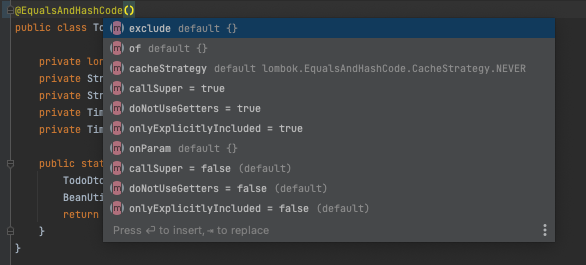Lombok @EqualsAndHashCode 애너테이션
1. 문제 상황
테스트 코드를 작성하는 중에 다음과 같은 문제를 만났습니다.
- Spy 테스트 더블(test double)을 이용한 테스트 코드 작성하였습니다.
- 메소드 파라미터로 전달한 파라미터가 동일한지 확인하는 과정에서 에러가 발생하였습니다.
테스트 코드
todoDto인스턴스를 요청 정보(request body)로 전달합니다.verify메소드로mockTodoService테스트 더블 인스턴스의createTodo메소드가 1회 호출되었는지 확인합니다.todoDto인스턴스가 전달되어createTodo메소드의 파라미터로 사용되었는지 확인합니다.
@Test
public void createTodo_invokeCreateTodo() throws Exception {
TodoDto todoDto = TodoDto.builder()
.id(-1)
.value("Reading a book")
.createdAt(null)
.build();
mockMvc.perform(post("/todo")
.contentType(MediaType.APPLICATION_JSON)
.content(new ObjectMapper().writeValueAsString(todoDto)));
verify(mockTodoService, times(1)).createTodo(todoDto);
}
에러 로그
Argument(s) are different!로그를 통해 사용된 인스턴스가 다르다는 것을 판단할 수 있습니다.
Argument(s) are different! Wanted:
todoService.createTodo(
com.tdd.backendspringboot.todo.dto.TodoDto@6069dd38
);
-> at com.tdd.backendspringboot.todo.controller.TodoControllerTest.createTodo_invokeCreateTodo(TodoControllerTest.java:154)
Actual invocations have different arguments:
todoService.createTodo(
com.tdd.backendspringboot.todo.dto.TodoDto@5a237731
);
-> at com.tdd.backendspringboot.todo.controller.TodoController.createTodo(TodoController.java:26)
2. 문제 해결
에러 로그를 보고 equals 메소드와 hashCode 메소드 오버라이딩을 떠올렸지만 이를 구현하는 일이 상당히 귀찮았습니다.
클래스에 정의된 필드들을 모두 비교해야한다거나 해시 코드 계산이 필요하기 때문입니다.
이를 쉽게 해결할 수 있는 방법을 찾아보니 Lombok에 @EqualsAndHashCode 애너테이션이 있었습니다.
해당 애너테이션을 클래스 위에 정의하면 컴파일 시점에 자동으로 equals 메소드와 hashCode 메소드 오버라이딩이 됩니다.
디컴파일(decompile) 한 코드를 살펴보면 클래스에 있는 모든 필드들에 대한 비교를 수행합니다.
@EqualsAndHashCode 애너테이션 사용
@EqualsAndHashCode
public class TodoDto {
private long id;
private String value;
private Timestamp createdAt;
private String userId;
}
TodoDto 클래스 디컴파일(decompile) 코드
public boolean equals(final Object o) {
if (o == this) {
return true;
} else if (!(o instanceof TodoDto)) {
return false;
} else {
TodoDto other = (TodoDto)o;
if (!other.canEqual(this)) {
return false;
} else if (this.getId() != other.getId()) {
return false;
} else {
label49: {
Object this$value = this.getValue();
Object other$value = other.getValue();
if (this$value == null) {
if (other$value == null) {
break label49;
}
} else if (this$value.equals(other$value)) {
break label49;
}
return false;
}
Object this$createdAt = this.getCreatedAt();
Object other$createdAt = other.getCreatedAt();
if (this$createdAt == null) {
if (other$createdAt != null) {
return false;
}
} else if (!this$createdAt.equals(other$createdAt)) {
return false;
}
Object this$userId = this.getUserId();
Object other$userId = other.getUserId();
if (this$userId == null) {
if (other$userId != null) {
return false;
}
} else if (!this$userId.equals(other$userId)) {
return false;
}
return true;
}
}
}
public int hashCode() {
int PRIME = true;
int result = 1;
long $id = this.getId();
int result = result * 59 + (int)($id >>> 32 ^ $id);
Object $value = this.getValue();
result = result * 59 + ($value == null ? 43 : $value.hashCode());
Object $createdAt = this.getCreatedAt();
result = result * 59 + ($createdAt == null ? 43 : $createdAt.hashCode());
Object $userId = this.getUserId();
result = result * 59 + ($userId == null ? 43 : $userId.hashCode());
return result;
}
3. @EqualsAndHashCode 애너테이션 속성
@EqualsAndHashCode 애너테이션 속성들 몇 가지를 추가적으로 정리하였습니다.
3.1. of 속성
특정 필드만 선택하여 equals, hashCode 메소드를 오버라이딩 합니다.
사용 예시 코드
@EqualsAndHashCode(of = {"id"})
public class TodoDto {
private long id;
private String value;
private String userId;
private Timestamp createdAt;
private Timestamp updatedAt;
}
클래스 디컴파일 코드
public boolean equals(final Object o) {
if (o == this) {
return true;
} else if (!(o instanceof TodoDto)) {
return false;
} else {
TodoDto other = (TodoDto)o;
if (!other.canEqual(this)) {
return false;
} else {
return this.getId() == other.getId();
}
}
}
public int hashCode() {
int PRIME = true;
int result = 1;
long $id = this.getId();
int result = result * 59 + (int)($id >>> 32 ^ $id);
return result;
}
3.2. exclude 속성
특정 필드를 제외하고 equals, hashCode 메소드를 오버라이딩 합니다.
사용 예시 코드
@EqualsAndHashCode(exclude = {"userId", "createdAt", "updatedAt"})
public class TodoDto {
private long id;
private String value;
private String userId;
private Timestamp createdAt;
private Timestamp updatedAt;
}
클래스 디컴파일 코드
public boolean equals(final Object o) {
if (o == this) {
return true;
} else if (!(o instanceof TodoDto)) {
return false;
} else {
TodoDto other = (TodoDto)o;
if (!other.canEqual(this)) {
return false;
} else if (this.getId() != other.getId()) {
return false;
} else {
Object this$value = this.getValue();
Object other$value = other.getValue();
if (this$value == null) {
if (other$value != null) {
return false;
}
} else if (!this$value.equals(other$value)) {
return false;
}
return true;
}
}
}
public int hashCode() {
int PRIME = true;
int result = 1;
long $id = this.getId();
int result = result * 59 + (int)($id >>> 32 ^ $id);
Object $value = this.getValue();
result = result * 59 + ($value == null ? 43 : $value.hashCode());
return result;
}
3.3. 기타 속성
위에 언급한 of, exclude 속성 이 외에 다른 속성들에 대한 간단한 설명으로 포스트를 마무리하겠습니다.
cacheStrategy- Determines how the result of the hashCode method will be cached.callSuper- Call on the superclass’s implementations of equals and hashCode before calculating for the fields in this class.doNotUseGetters- Normally, if getters are available, those are called.onlyExplicitlyIncluded- Only include fields and methods explicitly marked with @EqualsAndHashCode.Include.onParam- Any annotations listed here are put on the generated parameter of equals and canEqual.


댓글남기기